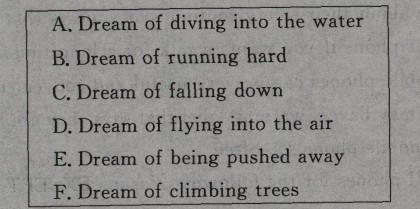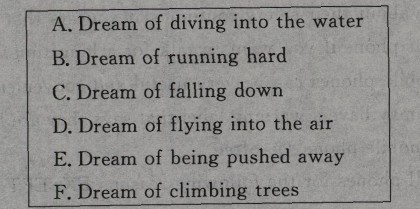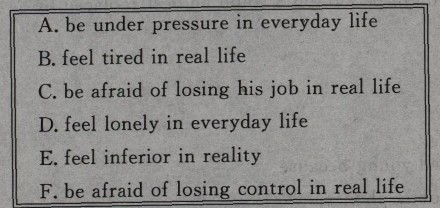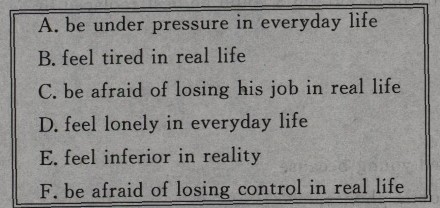Friends play an important role in our lives, and although we may take friendship for grant
Some friendly relationships can be kept on despite argument or heated discussion, but it is usual for close friends to have similar ideas, beliefs, attitudes, and interests. In fact, close friends may sometimes talk about "being on the same wavelength". It generally takes time to reach this point. And the more intimately involved people become, the more they rely on each other, People want to do friends favors and hate to break a promise. Equally, friends have to learn to put up with any annoying habits and to tolerate differences of opinion.
In contrast with marriage, there are no government-sanctioned friendship ceremonies to strengthen the association between two people. But the support and understanding of each other that result from shared experiences and emotions do seem to create a powerful bond, which can overcome difference in background, and thus break down barriers of age, class, or race.
According to the author, ______.
A.a(chǎn)ll those who get on well with each other are friends
B.friends are closer than people who just get on well with each other
C.everyone understands clearly how to make friends
D.every student has six friends
 搜題
搜題
第1題
【C1】
A.given
B.provided
C.granted
D.presented
第2題
1. Dreams play an importantrole in our lives. If they can be correctly interpreted,we can come tounderstand ourselves better. Here,we look at four common dreams and what theypotentially symbol-ize.
2. I can see their laughing faces ... laughing at me. But they aren &39;t as smart. If they were , they &39;d be up here flying with me ! This dream has both positive and negativeconnotations(涵義). On the pos- itive side,the dream may express a strong desire to traveland get away from everyday routine. It can also be interpreted as a powerfuldesire to achieve. On the other hand,this dream can mean the person has aproblem or is afraid of something and they wish to escape. The dream couldrepresent an inferior-ity complex(白卑情結(jié)),which the dreamer attempts to escape from byputting themselves up above others.
3. I&39;m moving fast now ,butit&39;s still behind me. Doesn&39;t matter how fast I go ,I still can &39;t escape. Although thisis a traditional symbol of health and vitality(生命力 )like the first one,it can also sug- gest thedreamer is trying to escape from danger. Usually, fear is the dominant emotion.By running hard,the dreamer can possibly escape the threat. However, they canalso stumble or worse still stop moving altogether. This makes the fear evenmore terrifying. One possible interpretation suggests that the person is underpressure in their everyday life.
4. I&39;m sweating and my heartis beating. I&39;m trapped in my own bed. In this dream, the person is oftenstanding on a high, exposed place such as on the top of a tower,or on the edgeof a cliff. The overwhelming(強(qiáng)烈的)feeling changes from anxiety to a loss of control. There is nothing tostop the person,and the feeling as they go over the edge can be horrifyingly(地) reaL Fortunately,justbe- fore hitting the ground,the dreamer awakens with a sense of enormousrelief. This dream suggests that the dreamer is afraid of losing control andhas a fear of failure or even death.
5. The wind is pushing meand I slip. There&39;s nothing I can do ... nothing I can hold on to. This symbolis associated with fear: suddenly the dreamer loses all power of movement. Theytry hard to move their arms and legs.but they simply cannot. Frozen in a terrifying situation with no escape,theybecome more and more terrified as the seconds go by. Another frequent contextfor this dream is failing
to do something in public,often something which you are normally verygood at,such as your job. Not only is this extremely embarrassing,but it alsoshows a deep-seated phobia(恐懼)of losing a job and a livelihood.
Paragraph 2

Paragraph 3

Paragraph 4

Paragraph 5

If a person puts himself up above others in the dream,he may _

If a person dreams of being chased by others,he may _

If a person dreams of going over the edge of a cliff,he may _

If a person dreams of failing to do something in public,he may _

請幫忙給出每個問題的正確答案和分析,謝謝!
第3題
Directions: This task is the same as Task 1. The 5 questions or unfinished statements are numbered 41 through 45.
Friends play an important role in our lives, and although we may take friendship for granted, we often don't clearly understand how we make friends. While we get on well with a number of people, we are usually friends with only a very few — for example, the average among students is about 6 per person. In all the cases of friendly relationships, two people like one another and enjoy being together, but beyond that, the degree of intimacy between them and the reasons for their shared interest vary enormously. As we get to know people we take into account things like age, race, economic conditions, social position and intelligence. These factors are of prime importance, as it is often more difficult to get on with people when there is a clear difference in means, background, maturity, and/or capabilities.
Some friendly relationships can be kept on despite argument or heated discussion, but it is usual for close friends to have similar ideas, beliefs, attitudes, and interests. In fact, close friends may sometimes talk about "being on the same wavelength". It generally takes time to reach this point. And the more intimately involved people become, the more they rely on each other, People want to do friends favors and hate to break a promise. Equally, friends have to learn to put up with any annoying habits and to tolerate differences of opinion.
In contrast with marriage, there are no government-sanctioned friendship ceremonies to strengthen the association between two people. But the support and understanding of each other that result from shared experiences and emotions do seem to create a powerful bond, which can overcome difference in background, and thus break down barriers of age, class, or race.
According to the author, ______.
A.a(chǎn)ll those who get on well with each other are friends
B.friends are closer than people who just get on well with each other
C.everyone understands clearly how to make friends
D.every student has six friends
第4題
A.Right
B.Wrong
C.Not mentioned
第5題
Numbers play an important role in Chinese culture and the use of numbers can be found in almost every aspect of people’s lives. At weddings, at funerals, in daily life and even in business, numbers, auspicious or ominous, may influence people’s choice or decision. There is a set of famous streets in Gaoxiong City in Taiwan, China, which all begin with numbers. They are Yixin (One Heart), Ersheng (Two Sacreds), Sanduo (Three Mores), Siwei (Four Upholds), Wufu (Five Fortunes), Liuhe (Six Realms), Qixian (Seven Virtues), Bade (Eight Moral Precepts), Jiuru (Nine Wishes), and Shiquan (Perfect Ten) Streets. This sequence of auspicious street names gives people a warm feeling when they hear it, and brings more than a little luck to the residents. Many foreign visitors can't help but exclaim that the Chinese are really creative, and can line numbers up so "auspiciously." Chinese not only use numbers to appeal for good fortune, they also bring them out to chew people out: "You 250 (fool), you do things neither three nor four (without any order or out of touch), and still you dare to say that I'm 13 points (stupid) and 3-8 (scatterbrained)." Although it isn't really possible to know where these came from, one thing is for sure: numbers are intimately related to the daily life of Chinese! Origins in the Book of Changes: In antiquity, people kept tallies by tying knots in ropes, and only employed numbers and words later on. From natural phenomena and life experience, people gradually came to recognize the signs of change in a particular matter. For example, there was the ancients' saying that "if the moon has a halo it will be windy, and a damp plinth foretells rain." It is inevitable that there will be misfortune in life, so people began to adopt ways to attract the auspicious and expel the malicious. Add to this that people have psychological activity and the ability to link things together in their minds, and a whole set of auspiciousness-attracting and evil-expelling habits took shape. The I Ching or Book of Changes is a compilation which records the experience of people in ancient times with luck and divination. In the Book of Changes, each number has some significance: one is the tai-ji or "great supreme," two is the "two rituals," three is for the "three powers," four for the "four directions, "five is for the "five pathways," six stands for the "six realms," seven for the "seven rules of government," eight means the "eight trigrams ,"nine is for the "nine chains," and ten is the "ten depictions." We often say "three yang make good fortune" to describe the hope that misfortune will be held at bay and good luck will follow. It is a saying often used at the New Year and symbolizes a new beginning and finds its origins in the Book of Changes. Yang is the positive force in the universe, and there is enormous yang and very weak yin (negative force) in the first, second, and third of the nine trigrams. So the three yang are very positive. Li Heng-li, chairman of the International Taoism Scholarly Foundation, who feels that numbers have no connection with fortune good or ill, says that the only significance numbers have is what people ascribe to them. Trying to say that a given number is either auspicious or ominous is mere superstition. Still, unlike the Western sensitivity to the number 13, Chinese have a whole philosophy built up around numbers, which is spread or experienced in real life. Gods can be alone, but people cannot: One is the number marking the beginning, and also has the meaning of "independent" or "alone." Tong Feng-wan, a professor of theology at Taiwan Theological Seminary, points out that in Taiwan people prefer even numbers which symbolize "fortune comes in pairs." They are more wary of one, three, five, seven, and nine. Because the character for "odd" in Chinese (dan) also means "alone," people are not very fond of it. But although people like even numbers, the gods can be alone. Thus in odd-numbered months holidays have been stipulated to help people get by, from New Years (first day of the first month on the lunar calendar) and Tomb Sweeping Day (third day of the third month) to Dragon Boat Festival (fifth of the fifth), Chinese Valentine's Day (seventh of the seventh), and Old People's Day (ninth day of the ninth month in the lunar calendar). At weddings, when Chinese people give "red envelopes" with gifts of cash, they only send even amounts, like 1 200 or 3 600. Because the pronunciation of "four" is close to that of "death" in Taiwanese, if you send 4 400 to the bride and groom, people won't be grateful and might even criticize you behind your back for failing to understand basic manners. At funerals, on the other hand, people usually give offerings with the last digit being odd, so as to avoid ill fortune not coming "alone." Happiness comes in pairs: In the book Popular Chinese Customs Professor Lou zhu-kuang notes that when people got married in ancient times, betrothal gifts would include a document recording all the details of the accompanying gifts. The writing style was rather meticulous. Thus, for example, chickens or ducks would be written as "Four wings of poultry." Gold bracelets would be written "Gold bracelets becoming a pair." Candles would be written as "Festive candles with double glow." No place would odd numbers be allowed. When inquiring into the other's name and the "eight character horoscope" of the other party, it would be written for instance: "The groom (or bride) is in the beginning of the sixth month of his (or her) twentieth year, having been born at such-and-such an hour..." The number of characters in the Chinese text would always have to add up to an even number; if they were short one then an "auspicious" character would be added. The writer Xiao Min adds that because the character for "odd" also means "incomplete," when she was in her old home in Beijing, they would always make sure that the number of steamed rolls made for New Year's was even in order to make a good beginning. Huang Bo-he, a scholar of folk traditions, argues that Chinese have always been rather inclined to the number three. Just open up a Chinese dictionary and there are sayings using three or multiples thereof sprinkled everywhere. They are even more numerous in local sayings and slang. He points out that one reason Chinese like three is that it stands for "many." In Lao Tzu it is said that "Tao gave birth to the one, the one gave birth to the two, two gave birth to three, and three gave birth to ten thousand things." From nothing to something, or something to infinity, "three" plays a critical role. Elevators without fourth floors: The scholar Su Xue-lin has written that in ancient China the numbers four and 72 were perhaps both mysterious numbers, and moreover that "four" was a symbol for the great earth. But in Taiwan four is not especially well looked-upon. Hospitals and hotels normally have no fourth floor, and the numbers in the elevator just skip right from three to five. It's probably only in places where Chinese people live that this type of facility is necessary. Also, the price of an apartment on the fourth floor is usually cheaper. In general, Chinese assign little good or bad significance to "five." "May the five fortunes approach your door" is a saying often seen at festive occasions. The five fortunes are long life, wealth, health, an ethical life, and a peaceful death. Besides this, the five elements (metal, wood, water, fire, earth) provided a framework for people at former times to classify natural phenomena. Confucianism also says that five implies the concept of "the mean." The writer on geomancy Zhen-zui points out that Confucians believe that five is very close to the path of the golden mean of "adopting the middle between two extremes," and also promotes the thought of the "five pathways." As a number, five has two at the front and two behind, with one in the middle. "This middle figure has two assistants on each side, and is unbiased in the middle. Thus five fits in well with the idea of the ‘mean’ always promoted by Confucian scholars," he has written. One six eight, on the way to success: Where did "66 everything goes smoothly" come from? Lin Mao-Xiao, executive secretary of the Chinese Customs and Handicrafts Foundation, contends that it might have something to do with playing dice. Six is the largest number on a die, so wouldn't one win by coming up with two sixes? According to informal statistics, not many people take seven to be a lucky number. According to the old text Yu Hsiao Ling Yin, when someone first dies the mourning period should be seven days. "Doing the sevens" is the custom at funerals in Fukienese areas. For the first seven days after someone passes away, to the seventh seven days, there are appropriate rituals for each. Some people, because the number seven can easily bring to mind "doing the sevens," plus the fact that the seventh month of the lunar year is "ghost month," don't like it. The fondness for "eight" comes, most people would say, from the Cantonese. In Cantonese, eight and "success" are similar in sound. And in North China, there is the saying that "if you want to succeed, don't stray from eight." Hong Kong, where most of the population is Cantonese, is perhaps the place where faith in numbers is strongest. Li Heng-li analyzes that it is a very crowded, very competitive industrial metropolis. Businessmen are especially obsessed with success or failure, so they have to include auspiciousness in consideration of any affair like opening a factory or signing a contract. If they can choose a day with eight in it, then they have a "successful" beginning. Nine symbolizes smoothness and endurance, while six, as noted, is for "66 everything goes smoothly." In the 1980's, lucky numbers went from Hong Kong into Guangdong Province in mainland China, as this trend began to spread from south to north. Liu Cheng-feng, columnist for the China Times, noted in one report that the last digits of the phone number of the Canton Hotel are 8168, a homophone for "success and yet more success." Most of the shoe stores in the Lungfu Building in Peking use "auspicious" prices on their tags. One of the fastest movers is one whose tag is 168, which symbolizes "the road to success." And when businessmen stay in hotels, they like to stay in rooms 518, 688, or 816. One hotel in Canton even has a higher price on rooms with lucky numbers. Believe it or not, it's up to you: Nine generally refers to a great majority or large number. In former times people often used nine to say "a great many." Because nine is an extreme number, Chinese have the saying that it is inauspicious to run across nine. Especially for older men, the 69th and 79th birthdays are celebrated as the 70th and 80th instead. Many people also believe that a young man of 29 is at the decisive point in life. When people use lucky numbers to symbolize wealth and fortune, or peace and benevolence, any number can be explained in such a way as to make it fit. Aren't "everything starts with one and comes around again," "seven generations living together," and "wealth flowing across the four seas" all pleasing to the ears? Although that's easy enough for us to say, there are still plenty of people who play the lotteries or play the ponies, running near and far, burning incense to the gods, looking for a lucky number that belongs only to them! 1. The ancients began to adopt ways to attract the auspicious and expel the malicious because ________.
A、they knew it was very important to do so
B、they believed that misfortune was not inevitable
C、they had psychological activity and the ability to link things together in their minds
D、they found that misfortune in life came with certain signs of change in a particular matter































